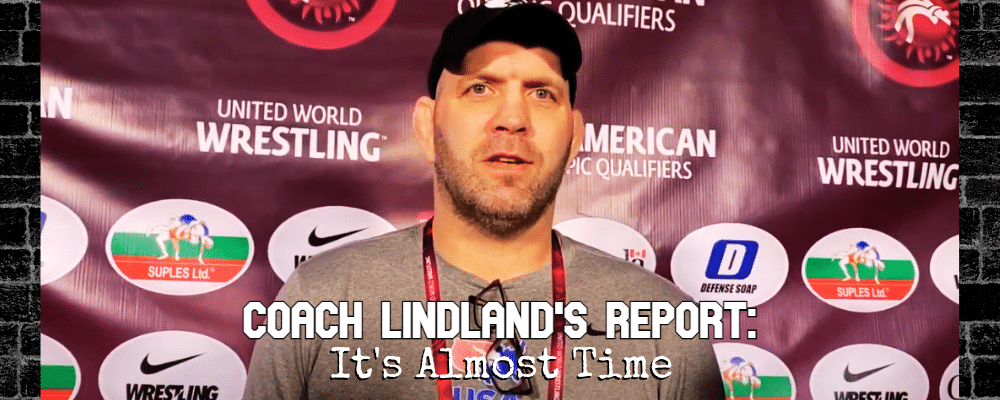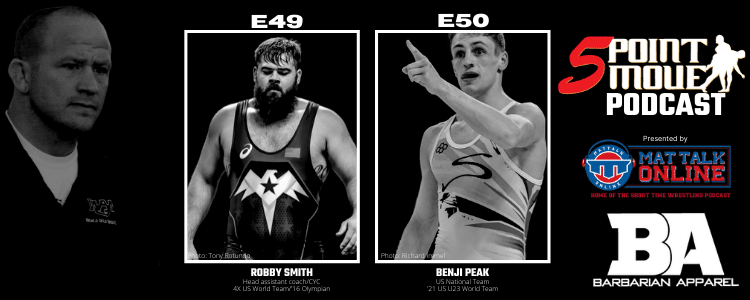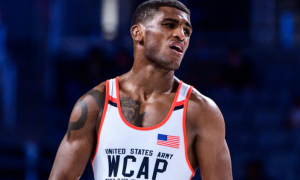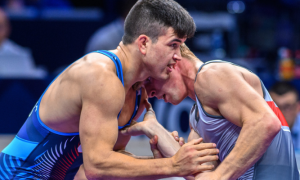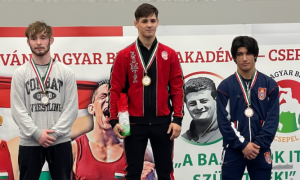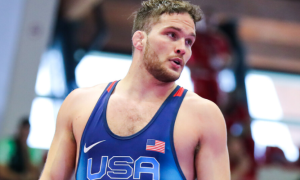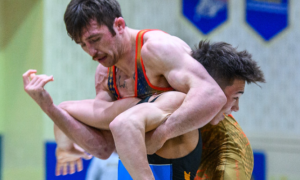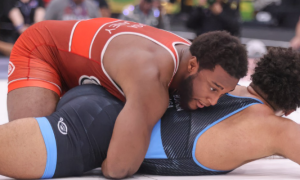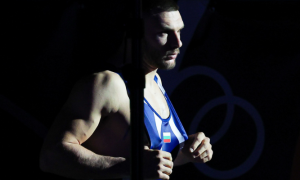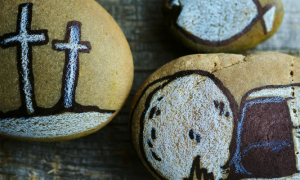Five Point Move is proud to host USA Greco-Roman National Team head coach Matt Lindland each week for Coach Lindland’s Report. Here is where you will find detailed perspectives from Coach Lindland pertaining to recent results, upcoming events, training plans, and other Greco-related news that isn’t available anywhere else. ALSO — if you would like to donate directly to the US Greco-Roman program, just click here. Your support is appreciated!
The moment has not arrived. It just feels that way. The human mind comprehends time according to a vast set of parameters. Some real, others imagined, and the context is always malleable. We do not abide by calendars simply for their convenience. We do it because without them, nothing would be left but incomplete frames of reference. You can trust 12 glossy sheets of paper pinned to a bulletin board. Your brain, on the other hand, continually cedes ground to distraction and impatience.
But the United States Greco-Roman Olympic Team is, in fact, departing for Tokyo this weekend.
And the National program’s head coach seems to feel at ease knowing that their unusually long and oft painstaking wait is nearly concluded.

Two Olympic camps down, another mini-camp in progress, and an encouraging uptick in morale following a year’s worth of unanswered questions and adapted training plans are logged in Coach Matt Lindland’s book as the clock winds down to zero hour. Lindland does not shy away from details when describing the US Team’s second and last gathering, which wrapped earlier this month in the metro-Atlanta region; nor does he hold back when discussing star upper-weight G’Angelo Hancock‘s (97 kg, Sunkist) customized preparation in Colorado Springs, shining a light on the “peaking” phase with which so many fans are enamoured.
Finally, there are the serendipitous circumstances surrounding this week’s “Last Chance Qualifier” for the 2021 World Team Trials. The Senior tournament is tasked with kicking off “Fargo Week”, but it is not the true Seniors who are generating conversation just yet. Instead, a collection of high-profile age-group athletes are leading the charge. Lindland acknowledges the irony associated with younger wrestlers taking top billing at a Senior event (in Fargo, of all places) — and the nature of purposeful development when comparing other nations to the US.
Although, the first question out of the gate pertains to a now-inactive World silver medalist.
5PM: Were you blindsided by Adam Coon signing a deal with an NFL team?
Coach Matt Lindland: Not entirely. Adam had reached out to me and said that he had some things he needed to do. He was basically asking if it would be okay if he missed training camp after not qualifying in Bulgaria (for the Olympics). So, I figured he just had things to do, personal stuff to take care of.
But it definitely did surprise me because Adam had been contacted by the NFL on bus rides home from the NCAA’s. It wasn’t a big surprise; he did not share with me that he was going to an NFL tryout. I saw the story moments after it was published. Whoever shared it with me probably has the ESPN app or something (laughs). I think I saw it 12 seconds after the news was released. I just congratulated Adam and wished him all the best on a text, but then I was fortunate enough to get a call. Adam called me when he was at the airport on his way home.
When we had dinner together in Ann Arbor, him and (wife) Molly were talking about how Tennessee was one of the places where she was looking to go to medical school. So, I hope that she gets into med school in Tennessee (laughs). It sounds like he has an incredible opportunity and a wonderful career in front of him.
Like I’ve told you in the past, Adam has had a lot of options. He is intelligent, he is athletic… It’s kind of funny, because when you talk to wrestlers, they’ll say, Adam’s not the quickest, he’s not the fastest… You’re comparing him to who? Gable Steveson? Who is fast for a 60 kilo guy? But Adam is quick when he is competing against other heavyweights in the world, and now he is competing against offensive linemen and dudes who didn’t wrestle. I mean, Adam is a super-athlete now (laughs). When he was a World medalist in ’18, he was an incredible wrestler in that tournament. Now he is competing against guys who aren’t wrestlers. He is going to excel so much in this sport. I can’t wait to watch his career unfold.
I’m really looking forward to following football for the first time. I was at the University of Nebraska in the ’90’s when they were winning title after title. That was a great thing for our program, but I was not a big fan. I think I went to three football games during the six years I lived in Lincoln, Nebraska. I’m just not a big fan of football, but now I have a reason to follow the sport somewhat.
5PM: The first session of Olympic camp in May came and went with good feedback. Then there was a break before everyone reconvened in Georgia for the second part of the camp. That last camp seemed to make a bigger impact on the athletes, for whatever reason. Since the response was so positive, what do you think were the key factors?
ML: First of all, I don’t think it was that weird of a break after the first camp in Atlanta. It was honestly an opportunity for us to go the Pan-Am Championships where we competed very well as a team. That was fun to watch. Guys made good adjustments and fixed some things. I felt like we wrestled incredibly well there. It was right in and right out of Guatemala. We went straight from camp and trained through the Pan-Am Championships. And we still had a dominant performance, which was exciting to watch. You want a balance. You’re trying to have success at the Pan-Ams, but you also want to periodize your training to peak at the right time, which is the Olympic Games.
Following the Pan-Am Championships in Guatemala, it was really the athletes’ time to get what they needed. Some guys felt like they needed competition in Poland, some guys felt they needed camp in Europe. We got the athletes what they said they wanted and needed, and I feel like that is really important because there are times when it is, I want to do what I need to do — and that was the second camp in Atlanta. It was programmed how I typically prefer: a lot of structure, a lot of organization. Here’s what we’re doing, here is when we are doing it. But within that framework, give the athletes time to work on what they want to specifically, or what them and their coaches have come up with. There was a lot of structure, but also a lot of freedom built into that training camp.
I also think it was the fact that it was all about Greco. We didn’t have to deal with the men and women freestyle teams. As great as it is to work with the other styles — and it is great for camaraderie and Team USA, and we’re all about Team USA here — this was our own special time. It was kind of a unique camp in that it was just us. We were sequestered in Alpharetta with a wonderful training facility, good hotels… That situation was great.
The guys were ready to work. I gave them the time they needed after the Pan-Ams. It was also what I needed. I needed them to go to the Pan-Ams and they performed well. Then they all had their own personal plans. By the time time we got to the second camp, it was a lot of structure, but within that structure was a lot of liberty to target their own specific needs. It was a lot of give-and-take with our athletes and coaches, and I just think that we worked really well together during that camp. I don’t know another way to explain that.
I wanted to get them home for the Fourth of July, so we broke camp on the 1st. They had at least until the 4th or 5th, and I came home on the 5th to start a training session for Tracy (G’Angelo Hancock). We have a great facility up at the Air Force Academy. The Army was running their own plans, just like John (Stefanowicz) in North Carolina with the Marine program. I think everyone felt like they got what they needed, which is really important at this juncture of the training cycle. We are working really well together with our athletes. They are getting what they need, and the coaches are getting what they want, too.
5PM: I’m not going to ask you to compare the attitude of these athletes compared to those on prior Teams, but confidence-building is a big part of every annual training phase for a World-level tournament. What has the talk been like at this stage between you and the Olympians given that we’re so close to the tournament?
ML: Well, you’re really familiar with our list and most of our readers are, too. There are the five areas we wanted to improve on starting in 2018, and really focus on those areas. Communication was at the top of that list. I think we — as coaches, athletes, and the program — have done a much better job of being transparent. I mean, I always try to be transparent, but it is about communicating better with one another. Whether it is in a meeting or one-on-one. Like I was talking about before, it was asking the athletes, What do you want?, and then figuring out where to put that into their plans.
This year was so strange with 2020 and the Olympics being moved, and just the timing of this. Even though we are training together at these Olympic Team training camps… I mean, I’ve run a lot of fight camps where you have one guy you have to prepare for competition. We had personal coaches with each of our athletes. They all had their own personal coaches, so it was basically like an individual fight camp and then we got together for certain practices and drills. But within those practices it was, You take those two partners and your coach, and work on these areas. I think the athletes felt like they got what they needed. I hope they did, because their attitudes were great.
We can compare this Team a little bit, just not necessarily to other Teams. I can tell you this: the guys on this Team are of the highest character. These are really great men who we have on this Team. They are incredible people. And in the past, I think we have had some guys on other Teams with questionable character. That is not what we have right now. We have really great athletes, really great competitors, and they are quality people. They are fun to be around and work with. That doesn’t mean there aren’t challenges. There are challenges, but not when it comes to attitude for this Team. We had guys coming into camp excited about whatever the next training session was, even when they were tired and worn down. The plan called for anticipating them to be a little tired, but we were still going to push through that because they had a good break to recover and rest before starting their training back up with their personal coaches again.
That is really what it boils down to. These are professional athletes who know what they need and their coaches are monitoring them very closely. And, as a program, we are all working together very well. It has been a lot of fun. The guys have had incredibly great attitudes throughout this training. It has been a really tough year. Having an Olympic Games pushed back an entire year was a very challenging environment to work in — but we did well. We worked really well in those environments. The only thing we are lacking is maybe a few more matches, though I don’t think anyone in the world has gotten more matches. I think we are all going into the Olympics in the same boat where everyone could have probably used one or two more competitions. That’s okay. Hopefully, our guys are very hungry to compete and that the time off the mat has them ready to get out there and fight. I’m excited to go to Japan on Saturday.
5PM: One athlete who certainly hasn’t had the number of matches to which he is accustomed is Tracy. But he has had his training opportunities, even in Europe last month, and Kevin Mejia Castillo was just here to work in with him as part of a mini-camp. But since Tracy is so competitively-minded, how have you been able to simulate that kind of environment because it is something he usually needs to have?
ML: We are doing the best we can to simulate competition in training, but it’s not the same. We actually had this specific conversation. This is what I was referring to when I said you want the athletes “hungry” and ready to get on the mat and get their hands on someone and attack. That is where I think Tracy is right now. He hasn’t had enough competition, and he’s hungry. And he knows that this is his shot. It only comes along every four years. This time it was five years, so it took a little longer (laughs). But that is exactly what I was referring to when it comes to athletes who are hungry and ready to attack an opponent. That is Tracy Hancock. He has not had the amount of competition that he normally gets, and enjoys. He likes going overseas and testing himself, and this is a big test.
Honestly, tomorrow (Wednesday) is also a big test for him. It is his last hard training session. It was supposed to be today but he got his final COVID shot on Sunday and was feeling under the weather on Monday. I just told him to take the day off, that “we have the time, we have the space. Don’t panic.” We were going to start our break on Wednesday but it will be Thursday instead. No big deal.
We had a wonderful training session today. We had everyone there. We had Patrick (Martinez), (Diante) Cooper, Kevin (Mejia Castillo), J’Den Cox, and one of the other freestyle athletes. The practice was for Tracy. It’s kind of fun when the camp is all about you (laughs). But it is also challenging because it is all about you. No one cares about how many takedowns the other guys are getting, or how many scores from top. And, if you give up a turn, everyone is watching because we are all rotating in on you. He has had fresh opponents, and that is kind of how we simulated. He is being stress-tested because he has guys coming in on him, instead of the same opponent and you wear each other down. He doesn’t have that luxury. But — you don’t have that in the Games, either. You are going to have to fight for six minutes with the chance to wear him out and Tracy does a very good job of that with his pressure and constant movement. He makes guys constantly adjust to him and that is what really wears guys out.
I remember during our era with me and Dennis Hall, it was push, pull, snap, bang, beat them up… Tracy is a lot more subtle in how he wears opponents down. He’s not fighting them; he is just making them carry his weight and making them move because he is attacking so frequently. He is putting them under constant threat to where they have to respond. That actually tires guys out more than pushing, pulling, snapping, and beating on guys.
When you are putting guys under constant, legitimate threat, they have to respond. That takes a lot of energy out of them and, when you’re the guy attacking, you can conserve some of that energy. It is always about minimizing the energy you are expending while getting the most out of that energy, but maximizing the amount of energy your opponent has to expend by attacking as efficiently as possible. That comes from staying in good position and moving your feet. We’re doing all of those things, and I really feel like he is going to be ready.
5PM: The Senior Last Chance Qualifier is opening “Fargo Week”. You had pointed out that Robert Perez is going to Last Chance and not Fargo Juniors, even though he is eligible. There are also a couple of Junior World Team members entering the Senior tournament, as well. It is interesting, because those mentioned, along with Tyler Hannah who will also wrestle on Friday, are the type we always want to come out of Fargo and become Senior competitors. Although that fraction tends to be smaller than we might hope, Friday’s Senior event seems like an appropriate way to demonstrate what that pathway could look like for youths who might be willing to give Greco a closer look outside of just Fargo every summer.
Coach Matt Lindland: I think you recognized that, and that is the same thing I was recognizing. I also hope some of our audience recognizes this. A guy like James Burks, who just a couple of years ago was on a Cadet Team. You’ve got Billy Sullivan and these other young, talented guys who are choosing to wrestle Greco. Camden Russell, you mentioned Tyler Hannah… It is exciting that these guys are starting to believe they can mix it up with Seniors, and they should be thinking that way as athletes. We just need more of our Greco athletes committing full-time.
Every time I go over to Europe, it just dawns on me over and over again. It is like, Man, we have better athletes than these guys, but ours are splitting their time going in multiple directions. If we find an athlete who is fully-committed to Greco-Roman? Look what we’ve done with a guy like Tracy Hancock, who started Greco-Roman at the Olympic Training Center when he was 17-years-old. He is about to wrestle in his first Olympics and has already been to the World Championships three times as a Senior, and he’s a Junior World medalist.
We see the path, but why aren’t all of our young athletes seeing the path? Maybe it is encouraging that we have this number of athletes who are seeing it. We have some really talented guys going out there and we mentioned some names. They are believing in themselves and they believe they can compete with our top Seniors. Some of them I think might even surprise themselves by qualifying and getting a shot at the World Team Trials. Would it be a shock? We saw Benji Peak, who missed out on a chance to go to a Junior Worlds in his last year of eligibility. Now he is on the Senior National Team and is moving up weight classes and is on the U23 World Team. He is also going to be a huge threat and contender to make a Senior World Team.
We are seeing it, but it’s not happening fast enough, is it? We are greedy. We want more guys who are committed full-time to Greco. More guys who recognize that there is a direct path from age-group World Championships to the Senior program and Senior Worlds, and fighting your way to a medal. I know we were talking privately about the Hungarian 97-kilo (Alex Szoeke) and it is like, Where did he come from? But then we looked back and in 2016 he was a Cadet World Champion. Now? He’s on their Olympic Team. And he won the Olympic qualifier, which was just a grinder of a tournament. His first Senior event was a gold at the ’20 European Championships. We hadn’t seen him, but he was training. He was training and preparing, and now Hungary has broken him out.
We have guys who can also do that if they are fully-committed and have the desire. And those are the guys we want. We just want the guys who believe they can do it and have the desire to do it. We’re not trying to get everyone. We are not trying to pull them away from colleges if they aren’t Greco guys. We just want the guys who are Greco athletes to continue down that path.

Listen to “5PM50: Mr. Fantastic Benji Peak” on Spreaker.
Listen to “5PM49: Robby Smith on coaching, fatherhood and mentors” on Spreaker.
Listen to “5PM48: Austin Morrow and Gary Mayabb” on Spreaker.
SUBSCRIBE TO THE FIVE POINT MOVE PODCAST
iTunes | Stitcher | Spreaker | Google Play Music

Notice: Trying to get property 'term_id' of non-object in /home/fivepointwp/webapps/fivepointwp/wp-content/themes/flex-mag/functions.php on line 999

